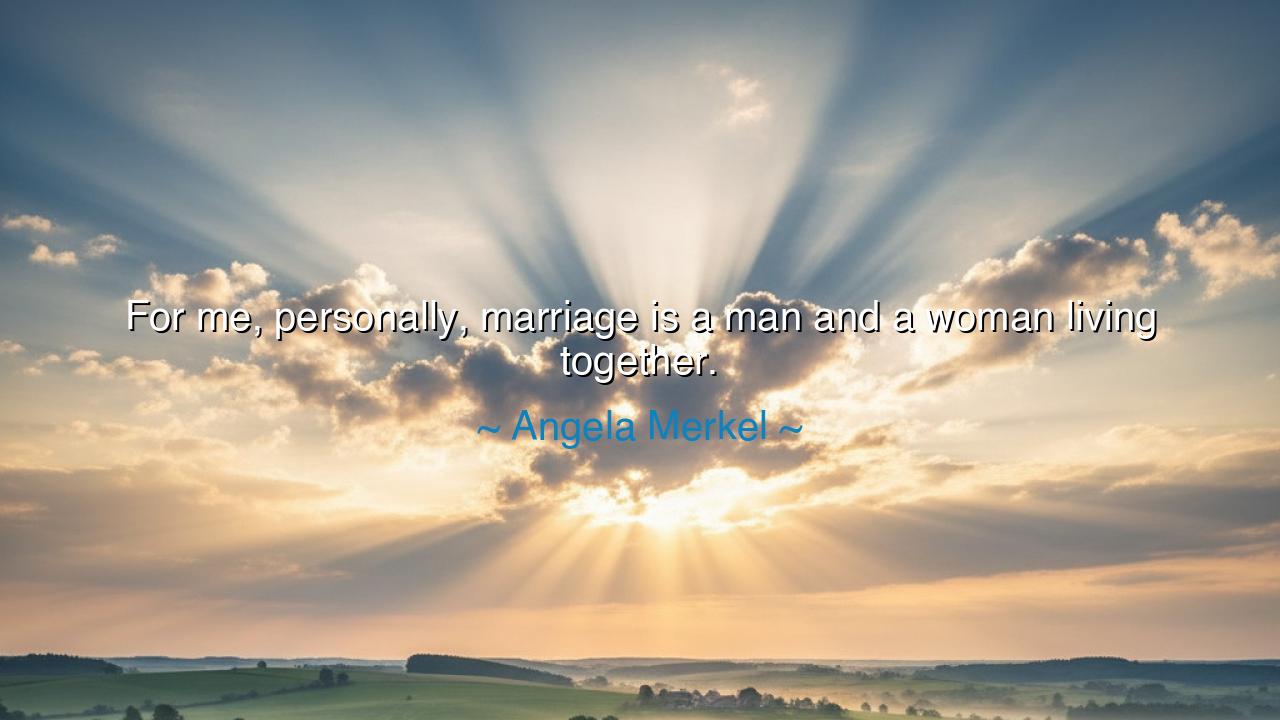
For me, personally, marriage is a man and a woman living






“For me, personally, marriage is a man and a woman living together.” — Angela Merkel
In this measured and contemplative statement, Angela Merkel, the former Chancellor of Germany, expresses a belief that bridges her personal faith and her public responsibility. Her words are not uttered in the tone of defiance, but of humility — a reflection of how tradition and modernity often meet in tension within the human heart. To say, “for me, personally,” is to acknowledge that her conviction arises not from political dogma, but from the inner conscience formed by faith, upbringing, and culture. It is an expression of personal truth within a world of expanding definitions — a recognition that in her eyes, marriage, as she was raised to see it, is the sacred union of man and woman, a bond that mirrors both nature and the spiritual order as she understands it.
The origin of this quote lies in Merkel’s public remarks during the long debate in Germany over same-sex marriage, a topic that stirred deep moral, religious, and social discussion throughout the nation. For years, Merkel’s government allowed civil partnerships for same-sex couples but stopped short of full marriage equality. When pressed on her position, she spoke these words — not as a declaration of hostility, but as a window into her conscience. In her statement, one can hear the careful balance of a leader who sought to honor both tradition and tolerance, who recognized the diversity of beliefs in her country while also remaining faithful to her own.
To understand the deeper resonance of her words, one must consider Merkel’s life and time. Born in divided Germany and raised under the shadow of Communism, she was also the daughter of a Lutheran pastor. Her faith taught her that marriage was a covenant before God, sanctified by the union of male and female — a reflection of divine creation itself. Yet her political life called her to govern a modern democracy, one where equality under law demanded that love and partnership not be bound by religious definition alone. Her statement, then, reflects the ancient struggle between personal conviction and public duty, between the beliefs we inherit and the realities we are called to face.
History is filled with figures who wrestled with such tension. Consider Marcus Aurelius, the philosopher-emperor of Rome, who wrote in his Meditations about the difficulty of holding to one’s principles while serving the diverse needs of the people. Like Merkel, he knew that a ruler must sometimes act beyond personal feeling to uphold harmony in the realm. And so it was that in 2017, when the German Parliament finally voted to legalize same-sex marriage, Merkel allowed a free vote among members of her party, even though she herself voted “no.” It was a decision that revealed her wisdom — to allow the will of the people to speak, while still remaining true to her own conscience.
Her words — “for me, personally” — thus hold profound meaning. They remind us that belief, when honestly spoken, need not be cruel. One may hold conviction without hatred, and one may honor tradition without denying others their dignity. The ancients taught that truth must walk hand in hand with compassion; that firmness without gentleness becomes tyranny, and gentleness without conviction becomes weakness. In Merkel’s phrase, we see the balance of both: a heart that knows its truth, yet allows others to live by theirs.
The wisdom of this quote lies not in the definition it affirms, but in the humility it conveys. Merkel does not claim that her view must be everyone’s view. She speaks only for herself, reminding us that faith and morality are deeply personal journeys. Her statement invites reflection rather than judgment. In a world eager to shout over one another, she speaks quietly — suggesting that the strength of belief lies not in imposing it, but in owning it with grace.
Let this be the lesson carried forward: conviction and compassion must dwell together. The soul that holds fast to its principles must also respect the freedom of others to do the same. Whether one believes that marriage is between man and woman, or between any two souls united in love, the measure of our humanity lies not in our agreement, but in our mercy. As the ancients said, “The wise man does not seek to conquer hearts, but to understand them.” Thus, from Merkel’s words, we learn that true strength is quiet, and that even in disagreement, respect is the bridge that keeps the world from falling apart.






AAdministratorAdministrator
Welcome, honored guests. Please leave a comment, we will respond soon